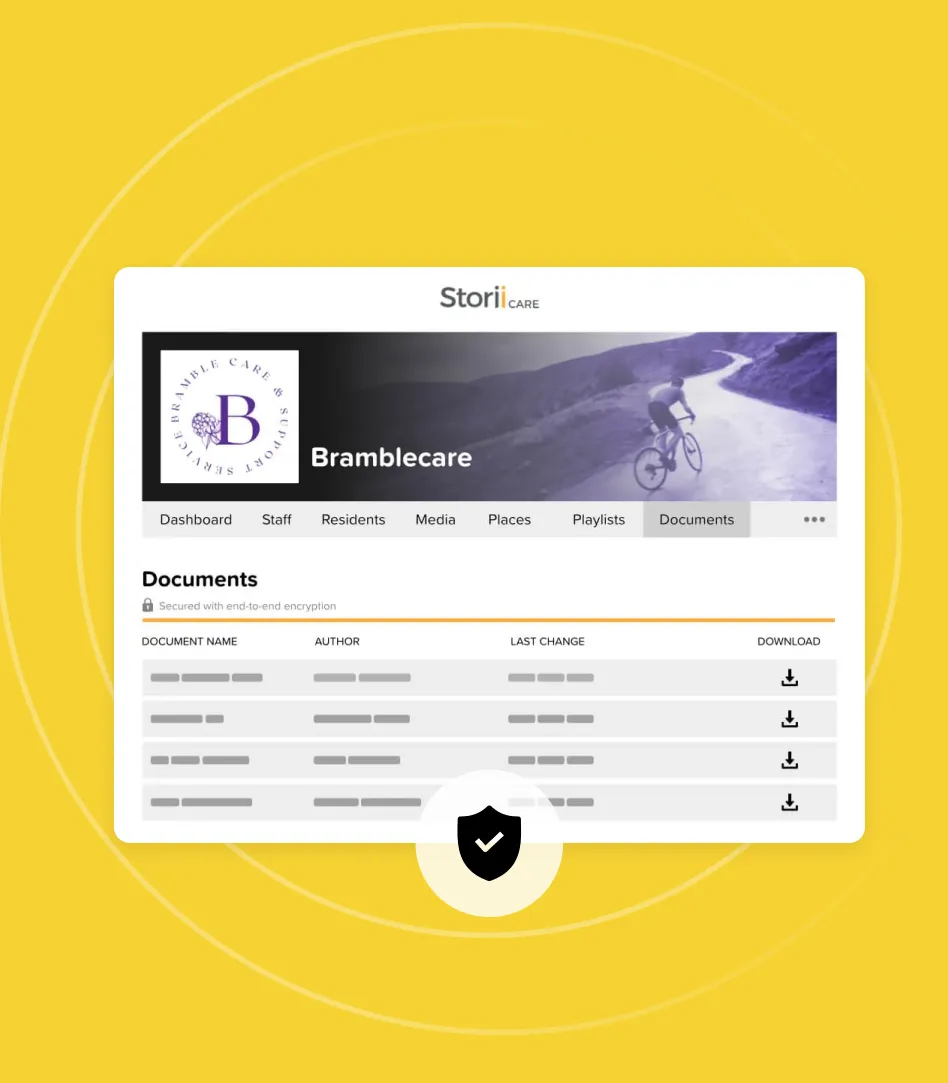医療業界は急速に進化を続けており、電子医療記録(EHR)システムは、高品質で効率的かつ個別化された医療を提供する上で中心的な役割を果たしています。これらのシステムは、文書化を合理化し、調整を改善し、ミスを減らし、医療提供者がより良い臨床上の意思決定を行えるようにデータを利用できるようにします。
市場には膨大な種類の EHR ソフトウェアソリューションがあるため、適切なソリューションを選択するのは大変な作業です。この総合ガイドでは、長期およびソーシャルケア環境向けの優れたプラットフォームであるStoriiCareの詳細を含め、2025年に医療提供者に最適なEHRソフトウェアシステムのベスト10を紹介しています。
EHR システムとは何ですか?
電子医療記録(EHR)システムは、患者の紙のカルテのデジタル版です。EHRは患者を中心としたリアルタイムの記録で、権限のあるユーザーが情報を瞬時に安全に利用できるようにします。これらのシステムには通常、次のものが含まれます。
- 患者人口統計
- 医療履歴
- 医薬品
- 診断
- 治療計画
- 予防接種日
- アレルギー
- ラボとテスト結果
最高のEHRソフトウェアは、このデータを保存するだけでなく、臨床ワークフローをサポートし、他のシステム(請求、遠隔医療など)と統合し、HIPAAなどのデータプライバシー規制に準拠します。
優れた EHR ソフトウェアとは
トップソリューションに飛び込む前に、EHRプラットフォームを評価する際に考慮すべき主な機能を次に示します。
- 使いやすさ:すぐに導入できる直感的なインターフェイス
- カスタマイズ:専門分野またはケア環境に合わせてカスタマイズ
- 相互運用性:ラボ、画像処理、薬局、その他のプロバイダーとのシームレスな統合
- コンプライアンス:HIPAAおよび地域の規制に適合
- 患者エンゲージメントツール:ポータル、メッセージング、予約など
- レポートと分析:医療の質と業務効率を向上させるための洞察
- サポートとトレーニング:アクセシブルなカスタマーサービスとオンボーディング
医療機関向けトップ 10 EHR ソフトウェアシステム
- ストーリーケア
こんな方におすすめ:地域密着型、長期間、ソーシャルケア提供者
StoriiCareは、ソーシャルケア、成人向けデイプログラム、生活支援、その他の長期介護施設で働く医療提供者向けに特別に設計された、直感的で専用のプラットフォームです。一般的な EHR システムとは異なり、StoriiCare は医療提供と研修医の関与の両方を向上させることに重点を置いています。
主な機能:
- カスタマイズ可能なテンプレートを備えたデジタルケアプラン
- 最新情報とマルチメディア共有を備えたファミリーポータル
- アクティビティとウェルビーイングのトラッキング
- インスタントレポートによる請求、コンプライアンス、監査
モバイル介護者向けのオフラインアクセス
- Cerner (オラクル・ヘルス)
こんな方におすすめ:中規模から大規模のプロバイダー
オラクルが所有するCernerは、部門間の緊密な統合による堅牢なEHR機能を提供しています。病院や外来施設で広く使用されています。
主な機能:
- リアルタイム分析
- 政府および公衆衛生システムとの相互運用性
- 統合収益サイクル管理
- モバイルチャート
短所:構成と保守が複雑になることがある。
- すべてのスクリプト (ヴェラディム)
こんな場合におすすめ:外来診療と専門医療
Allscriptsは、中小規模の医療提供者に柔軟なソリューションを提供します。そのオープンアーキテクチャは統合と革新を促進します。
主な機能:
- カスタマイズ可能なワークフロー
- 診療管理ツール
- 遠隔医療機能
- 公衆衛生支援
短所:一部のユーザーから、ユーザビリティの問題や更新の遅延が報告されています。
- アテナヘルス
こんな場合におすすめ:クラウドベースの診療と価値に基づく医療
Athenahealthは、相互運用性と収益サイクルのパフォーマンスを重視したクラウドベースのEHRプラットフォームです。頻繁に更新され、使いやすいことで知られています。
主な機能:
- 直感的なインターフェイス
- 患者エンゲージメントツール
- リアルタイムの洞察
- 広範なパートナーエコシステム
短所:小規模なプラクティスでは費用がかかる可能性があります。
- eクリニカルワークス
こんな場合におすすめ:費用対効果の高いソリューションを探している中小規模のプラクティス
eClinicalWorksは、強力なカスタマイズとAI主導のドキュメンテーションツールを備えた多用途のEHRおよび診療管理スイートを提供します。
主な機能:
- クラウドとオンプレミスのオプション
- 遠隔医療と電子処方
- 収益サイクル統合
- AI チャート作成アシスタント
短所:サポートと複雑さに関するユーザーレビューがまちまちです。
- 次世代ヘルスケア
こんな場合におすすめ:専門医療機関と地域保健センター
NextGenは、行動医療、小児科、歯科治療などの診療固有のニーズに合わせた、専門分野に焦点を当てたEHRソリューションを提供しています。
主な機能:
- モバイル EHR アクセス
- 統合請求
- 予測分析
- 専門分野別テンプレート
短所:一部のユーザーから、パフォーマンスの問題やアップデートの遅延が報告されています。
- カレオ (現テブラ)
こんな場合におすすめ:独立系企業とスタートアップ
Tebra傘下でブランド名を変更したKareoは、クラウドアクセスと統合請求により、シンプルなEHRエクスペリエンスを提供します。
主な機能:
- 患者のセルフスケジューリング
- クレーム管理
- モバイルフレンドリーなデザイン
- 無料のトレーニングリソース
短所:複雑な専門分野に必要な深みがない場合があります。
- 練習フュージョン
こんな場合におすすめ:予算重視のスモールプラクティス
Veradigmが所有するPractice Fusionは、小規模な診療所に最適な基本機能を備えた無料のクラウドベースの電子カルテです。
主な機能:
- ゼロコストモデル
- 簡単なセットアップとインターフェース
- 統合チャート
- パートナー統合
短所:カスタマイズとサポートのオプションが限られている。
- ドクター・クロノ
こんな方におすすめ:モバイルファーストのプロバイダーと Apple ユーザー
DrChronoはモビリティを念頭に置いて構築されており、優れた使いやすさとリアルタイムのデータアクセスを備えたiPadおよびiPhone用のネイティブアプリを提供しています。
主な機能:
- 音声認識チャート
- オンライン予約と受付
- 保険適格性チェック
- 遠隔医療統合
短所:高度な機能には有料プランが必要です。
- エピックシステムズ
こんな場合におすすめ:大規模な病院や医療機関
Epicは、米国で最も広く採用されているEHRシステムの1つです。その強力な機能と幅広い統合で知られるEpicは、外来患者、入院患者、専門医療にまたがる統合プラットフォームを提供しています。
主な機能:
- 広範囲にわたるカスタマイズ
- マイチャート患者ポータル
- 人口保健ツール
- 強力な相互運用性
- プロバイダー向けモバイルアクセス
短所:実装に費用がかかり、リソースを大量に消費するため、大規模な運用に適しています。
StoriiCare が際立つ理由:
- 人を中心としたケア:ライフストーリー、好み、心の健康を捉えます
- ケアコーディネーション:ログ、ハンドオーバー、アラート、メモを 1 か所に
- リアルタイムレポート:ケアの質、スタッフのパフォーマンス、インシデントログを監視します
- カスタマイズ可能:特定のケア環境に合わせたモジュール機能
- デジタルサイネージとカレンダー:毎日のアクティビティやメニューを紹介
ユースケース例:
ある認知症ケア施設では、StoriiCareを使用して医療ニーズを管理し、活動への参加状況を追跡し、ライフストーリーの共有や視覚的な更新を通じて家族の密接な関与を維持しています。
短所:急性期医療を目的としていません。長期および社会的ケアに最適です。
最終的な考え:ニーズに合った適切なEHRの選択
適切なEHRソフトウェアは、診療規模、専門分野、ケアモデル、長期目標によって異なります。大企業病院にはEpicやCernerが最適かもしれませんが、Athenahealth、DrChrono、StoriiCareなどのアジャイルでカスタマイズされたソリューションの方が小規模または専門医療提供者の方がメリットを得られることがよくあります。
StoriiCareは、長期ケアやソーシャルケアの分野に新たな視点をもたらし、実用的な臨床ツールと、家族やスタッフのアウトカムと体験の両方を向上させる居住者中心の機能を組み合わせた新しいEHRシステムを提供します。
サマリーテーブル
EHRシステム—最適な用途—主な機能
Epic — 大規模病院システム — 部門間の統一医療
Cerner — 病院と公衆衛生 — リアルタイム分析
Allscripts — 専門分野 — カスタマイズ可能なワークフロー
Athenahealth —クラウドベースのケアモデル—迅速な実装と更新
eClinicalWorks — コスト意識の高い中規模プラクティス — 人工知能を活用したドキュメンテーション
NextGen — 専門クリニック — 専門分野別テンプレート
Kareo (Tebra) — 独立診療所 — 統合請求で使いやすい
プラクティス・フュージョン — スモールプラクティス — 無料、シンプル、アクセスしやすい
DrChrono — モバイルファーストのワークフロー — アップルインテグレーション
StoriiCare —長期および社会的ケア—ライフストーリー、ファミリーポータル、監査
ケア環境を変える準備はできていますか?
長期ケア、在宅ケア、またはソーシャルケアに焦点を当てた医療提供者であれば、今こそStoriiCareがどのようにチームのパフォーマンスと居住者の満足度を向上させることができるかを探る時です。
www.storiicare.comにアクセスして詳細を確認するか、施設のニーズに合わせた無料のデモをリクエストしてください。




.png)

.png)










